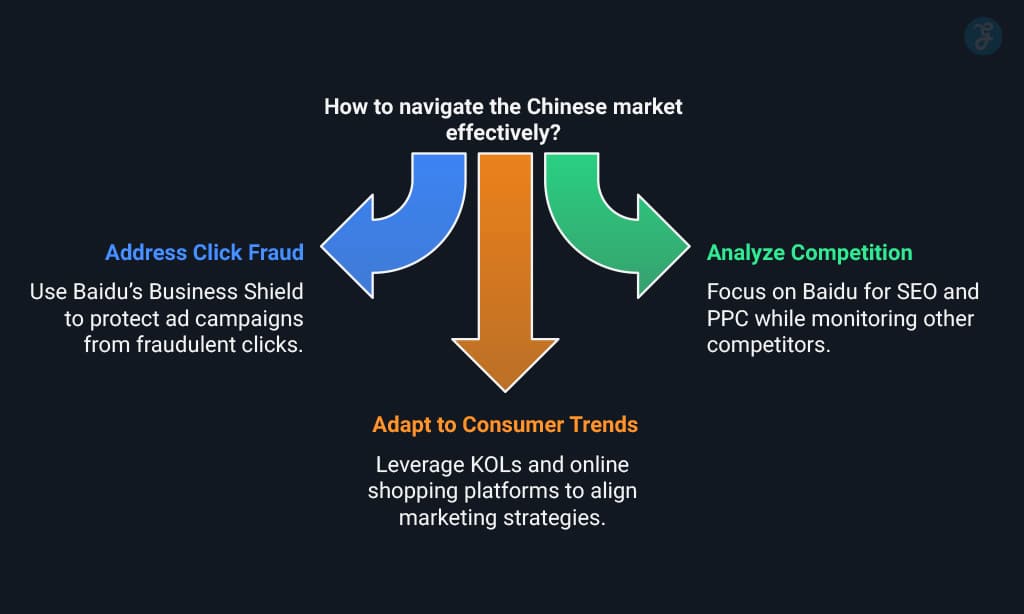Making money from websites in China can be tricky. Baidu, the top search engine in China, works differently than Google. To succeed, you need smart strategies for SEO and advertising that cater to Baidu’s unique system.
Olivier Verot, an expert in Baidu advertising with years of experience, shares key tips in this guide. You’ll learn how to use Baidu SEO, master paid ads on Baidu Tuigang, and create content locals trust.
Keep reading—this guide has what you need!
SEO Strategies for Baidu
Baidu SEO requires a different approach than Google. Focus on local strategies and tools, like Baidu Webmaster Tools, to improve your website’s visibility in search results.
Optimizing for Baidu’s search algorithms
Hosting your website on a .cn domain is essential. Servers in China also boost rankings because Baidu’s algorithm favors local websites. Fast-loading sites gain an edge, especially for mobile users who dominate the Chinese market.
Content must be in simplified Chinese to meet user preferences and censorship laws. “Baidu prioritizes clear, localized content over complex designs,” experts say. Avoid black hat SEO tricks like keyword stuffing or link spam—these can hurt visibility.
Meta tags, meta descriptions, and sitemaps are critical tools for optimization. Use Baidu Webmaster Tools to detect issues with indexing and improve SEO performance. Focus on creating rich snippets and clean URLs for better search engine results pages (SERPs).
Localized content and keyword selection
Use Mandarin Chinese to connect with the audience. Most users in China prefer content in their native language. Simplified Chinese increases trust and improves user engagement.
Focus on long-tail keywords for better targeting. These help address specific search intents and boost conversion rates. Use tools like Baidu Webmaster Tools to track keyword performance often.
Choose words that fit local culture and habits. Include phrases common among your target group for higher rankings on Baidu’s search engine result pages. A .cn domain or hosting within China also boosts visibility online.
Importance of Mandarin Chinese in content
Mandarin Chinese is essential for Baidu SEO. Baidu favors content written in Simplified Chinese, boosting visibility on its search engine. Using Mandarin ensures better engagement with the target audience and improves website traffic.
High-quality, user-focused content crafted in Mandarin ranks higher.
Chinese users expect culturally relevant material in their native language. Content must follow China’s censorship rules to avoid penalties. Including localized keywords strengthens your SEO strategy and helps attract organic traffic from Baidu search results pages.
Baidu Ads: Maximizing Paid Advertising
Baidu Ads offer businesses a powerful way to gain attention in the Chinese market. Use smart strategies to boost clicks, improve conversions, and grow your online presence.
Types of Baidu Ads: PPC, Brand Zone, and Information Feed Ads
Baidu Ads offer businesses powerful tools to reach the Chinese market. Each ad type is unique and helps drive website traffic effectively.
- PPC (Pay-Per-Click) Ads: PPC ads appear on Baidu’s search engine results pages (SERPs). Businesses bid on keywords for these spots. Costs depend on CPC (Cost-Per-Click) rates, often lower than Google Ads. These ads drive targeted traffic and increase conversion rates.
- Brand Zone Ads: Brand Zone Ads create a premium spot for big brands at the top of search results. This format costs around $1,500 per month. It includes logos, links, and descriptions to boost brand trust and user engagement.
- Information Feed Ads: Information Feed Ads blend into Baidu’s content, much like Facebook ads. Introduced in 2016, they use visuals and short text to grab attention on mobile apps or partner sites. These ads suit video promotions or product launches well.
Setting up a Baidu PPC account
Setting up a Baidu PPC account helps businesses target the Chinese market. Follow these steps to get started quickly.
- Register your business in China or East Asia. Only businesses registered in these regions can use Baidu Tuigang.
- Gather the required documents for setup. Provide proof of business registration and company bank details.
- Pay the initial fees to activate your account. Deposit 5,000 RMB for ad expenses and pay an annual fee of 600 RMB.
- Choose your targeting options carefully. Use device targeting, geo-targeting, and interest-based filters to reach specific audiences.
- Create engaging ad copy in simplified Chinese. Culturally relevant ads perform better with local users.
- Design a strong landing page for your ads. Ensure it is user-friendly, fast-loading, and optimized for mobile devices.
- Monitor and optimize your campaign regularly using Baidu tools like Tuigang’s dashboard or Editor Tool for managing ads effectively.
Tips for effective ad copywriting and landing pages
Ad copywriting and landing pages are key for Baidu PPC success. Great ads attract clicks, and strong landing pages drive conversions.
- Use clear and persuasive language in your ad titles. Baidu PPC allows 50 characters for titles, so make every word count.
- Highlight special offers in the ad text. Offers like discounts or limited-time deals catch attention fast.
- Write short, action-focused sentences in the description lines. You get 80 characters per line, so stay concise yet impactful.
- Ensure all ads follow Baidu’s advertising rules. Violations can lead to account bans or disapproval of campaigns.
- Make sure landing pages load quickly on all devices. Slow pages drive users away and lower conversion rates.
- Use mobile-friendly designs for landing pages. Most Chinese internet users browse on smartphones.
- Include a strong call-to-action (CTA) right at the top of your landing page. Push users to act immediately—like “Buy Now” or “Sign Up.”
- Create landing pages in simplified Chinese for better user experience on the Chinese internet.
- Optimize keywords on both ads and landing pages for Baidu’s search engine algorithm.
- Regularly track performance with Baidu Webmaster Tools and web analytics tools to improve CTR (click-through rate).
Monitoring Baidu Ads performance
Track Baidu Ads performance regularly to improve results. Pay attention to click-through rates (CTR), as higher CTRs boost ad rankings. Use detailed evaluation reports, like those in Google Analytics, to check keyword success and conversion rates.
Watch for signs of click fraud, which can harm ROI. Monitor CPC bidding closely because high bids often mean better placements on the Baidu search engine. Adjust your campaigns based on user behavior data and keyword performance trends.
Combining SEO and PPC for Better Results
Combining SEO and PPC can boost website traffic and improve conversion rates. Use Baidu’s Phoenix Nest to align paid campaigns with organic strategies for better results.
Balancing organic and paid traffic strategies
Using both organic traffic and paid traffic grows website visibility faster. SEO focuses on boosting your Baidu search engine rankings naturally over time. It improves user experience, builds trust, and increases website traffic without extra costs.
Paid strategies like Baidu PPC ensure quick results by driving leads or sales immediately. Both methods work differently but together create a stronger online presence.
Paid ads can reveal high-performing keywords through data analysis. Use this knowledge to improve your SEO strategy for better placement in SERPs (search engine result pages). Organic content drives long-term engagement while PPC offers short-term wins—balancing the two maximizes ROI (return on investment) effectively for Chinese markets using tools like Phoenix Nest.
Leveraging Baidu Phoenix Nest for campaign optimization
Baidu Phoenix Nest is key for better PPC campaigns. It works like Google Ads, helping advertisers target users on Baidu. Use A/B testing to find the best keywords and get high-quality traffic at lower costs.
Focus on specific terms that align with your product or service.
The platform’s Business Shield tool stops invalid clicks and fraud, protecting ad budgets. Monitor your campaign through Baidu’s Editor Tool, which supports both Mandarin and English.
Test different ad copies and landing pages to improve conversion rates and ROI (return on investment).
Localized Marketing Strategies
Understanding local habits is key to marketing in China. Create content that connects with the culture and matches consumer preferences.
Creating culturally relevant content
Content must match Chinese culture to attract users. Use local idioms, humor, and traditions in your writing. For example, a New Year campaign should reflect customs like red envelopes or family meals.
This makes your website feel familiar to the audience.
Mandarin Chinese is key for effective search engine optimization and digital marketing in China. Translate text accurately with tools or hire local experts. They can help create localized keywords that resonate with users better than direct translations.
Collaboration with Chinese influencers increases trust and visibility. Local marketers also give insights into slang, cultural trends, and behaviors for crafting strong messages. Their advice helps avoid mistakes that may offend or confuse readers on Baidu search engines or other platforms used widely across the web in China.
Adapting to Chinese consumer behavior
Chinese consumers value trust and relationships in business. Many rely on recommendations from Key Opinion Leaders (KOLs) before making decisions. Collaborating with KOLs can boost credibility and drive website traffic.
Platforms like XiaoHongShu are highly influential for product reviews and purchase ideas.
Economic uncertainties have shifted spending habits. Shoppers now focus more on value than brand names. Clear pricing, discounts, and loyalty programs work well to attract cautious buyers.
Simplified Chinese content should address their concerns directly while showing quality and reliability.
Online ads perform better in China compared to Western markets. Consumers are less likely to ignore them but prefer engaging, culturally relevant messages. Tailoring ad designs and website layouts for platforms like Tmall.com or Baidu Ads increases conversions effectively.
Compliance with China’s advertisement laws and regulations
Breaking China’s ad laws can lead to steep fines. Penalties range from three to five times the advertising spend. The State Administration for Market Regulation (SAMR) monitors ads closely.
They ensure fairness and protect consumers from misleading claims.
Avoid using unauthorized national symbols or exploiting audiences in your ads. Ads must also follow cultural sensitivities and avoid false information. Following these rules ensures smooth operations in the Chinese market and avoids costly mistakes.
Tools and Resources for Website Monetization
Using the right tools can boost your website’s success in China. Focus on platforms that simplify ad management and improve user engagement.
Baidu Tuigang (Advertising Platform)
Baidu Tuigang is Baidu’s main advertising platform. It supports businesses that use pay-per-click (PPC) ads to reach users. Only companies registered in China or East Asia can access it.
To set up, you need proof of business registration and company bank details.
This platform lets advertisers create more detailed ads than Google Ads. Titles allow 50 characters, while text lines go up to 80 characters. These longer formats help deliver clearer messages to consumers.
This extra space helps improve click-through rates (CTR) and conversion rates if used wisely.
Brands often rely on tools like Baidu’s Editor Tool for smoother ad management. With better control over keywords and targeted advertising, businesses can drive website traffic faster in the Chinese market.
Using Baidu’s Editor Tool for ad management
Baidu’s Editor Tool helps manage PPC ads easily. It supports both Mandarin and English for global users.
- Set up ad campaigns with simple steps. The tool provides options to create, edit, and organize ads quickly.
- Track your keyword performance. It shows data on clicks, impressions, and conversion rates in real-time.
- Use the Budget Accumulation Tool (Yusuan Leiji Bao). This feature transfers unused budgets to gain more search traffic later.
- Adjust bids and budgets instantly. You can increase or lower bids based on campaign performance without delay.
- Create effective ad copy directly in the tool. It allows you to preview how ads will appear on Baidu’s search engine results page.
- Analyze reports similar to Google Analytics’ style. These detailed insights help improve ad strategies fast.
- Manage bulky campaigns at once efficiently. The platform simplifies handling hundreds of keywords or ads simultaneously.
- Optimize targeting with advanced filters like location or device type for better ROI.
- Schedule your ads to run at the best hours of the day using time-based settings.
- Monitor campaign health using Baidu Webmaster Tools integrations for tracking indexing and SEO impacts from ads.
Tackling Challenges in the Chinese Market
Doing business in China comes with unique roadblocks. You must stay alert to market trends and adjust quickly for success.
Addressing click fraud on Baidu
Click fraud can drain ad budgets fast. Baidu’s Business Shield tool stops fake clicks and protects campaigns. It tracks patterns to find and block fraudulent activity before it harms your ads.
Regularly check conversion rates and keyword performance to catch issues early. Use Baidu Analytics for detailed reports on traffic quality. A/B test keywords often—some reduce costs while bringing better traffic.
Understanding competition and market trends
Baidu dominates the search engine market in China. It holds the largest share, while Qihoo 360, Sogou, and Soso compete with smaller portions. Businesses should watch these competitors but focus on Baidu for SEO and PPC efforts.
Knowing Baidu’s strengths can help craft better strategies.
Consumer habits have changed due to economic shifts. People now spend more cautiously and rely heavily on online shopping platforms like Taobao. Key Opinion Leaders (KOLs) greatly influence buying decisions in this market.
Following these trends helps businesses adapt their marketing plans smartly.
Takeaways
China offers a unique chance for website growth and profit. With strong tools like Baidu SEO, PPC ads, and local strategies, businesses can succeed online.
Michael Yang, a digital marketing expert with 15 years of experience in Chinese markets, shares valuable insights here. He holds a master’s degree in marketing from Tsinghua University.
Michael has worked with top firms to boost their web presence in China. His research on Chinese consumer behavior is widely respected.
Michael notes this guide blends practical SEO methods with smart advertising tips on Baidu’s platform. By focusing on Mandarin content and China’s market rules, it helps companies reach the right audience effectively.
Transparency matters deeply in China’s strict ad space. Michael highlights how this guide ensures compliance with ad laws while promoting honest practices. It also stresses ethical content creation for user trust.
For best results, he suggests combining organic traffic efforts with paid campaigns using tools like Baidu Tuigang or Phoenix Nest features for optimization.
The pros are clear: precise keyword research advice, cultural adaptation tips, and step-by-step account setup help users avoid mistakes. The only drawback might be the initial costs associated with starting Baidu PPC campaigns.
In his final opinion, this guideline offers unmatched value for those aiming to monetize websites successfully within China’s vast but tricky market landscape!
For more insights into digital trends in China, check out our article on how China’s e-learning industry is transforming education by 2025.
FAQs on Guide to Monetizing Websites in China
1. What is Baidu SEO, and why is it important for the Chinese market?
Baidu SEO refers to optimizing your website for Baidu, China’s leading search engine. It’s essential because most internet users in China rely on Baidu instead of Google due to the Great Firewall.
2. How does the Baidu algorithm differ from Google’s?
The Baidu algorithm focuses heavily on localized content, simplified Chinese, meta keywords, and fast-loading pages hosted within China. Unlike Google SERPs, it prioritizes websites that comply with local rules and have secure hosting.
3. What are some key strategies for increasing website traffic in China?
To boost traffic in China, focus on keyword research using tools like Baidu Webmaster Tools or other SEO tools. Use responsive design, optimize conversion rates through A/B tests, create high-quality content for organic traffic, and invest in PPC advertising like Baidu Ads or display ads.
4. Can I run both Google Ads and Baidu PPC campaigns together?
Yes! Running both can help you target audiences inside and outside of China effectively. However, remember that each platform has different rules—Baidu PPC requires a specific strategy tailored to its audience.
5. What role do link building and user experience play in China’s digital marketing?
Link building helps improve rankings on search engines like Baidu by increasing credibility through backlinks from trusted sources such as Q&A websites or platforms like Wei Zexi’s case studies. User experience ensures visitors stay longer by offering clear navigation and relevant information.






































